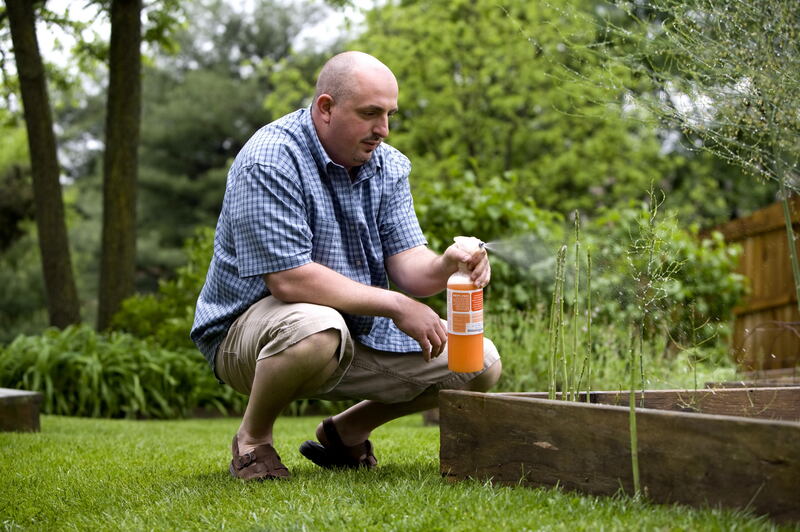What’s the difference between chemical and biological control? It mainly lies in the substances used — synthetic chemicals for chemical control, and living organisms for biological pest control to eliminate pests.
In this article, the two methods of pest control — chemical control and biological pest control — will be explained. This is for you to differentiate and gain a deeper understanding of how these methods are utilized based on the advantages and disadvantages of each type.

What Is Chemical Control?
Chemical control uses synthetic chemicals to eliminate pests. This type of pest control is based on toxic (poisonous) substances or strong chemicals, popularly known as pesticides, which can effectively control or kill pests without harming the crops.
Since pesticides are made up of toxic substances, consuming them is not advisable. Proper sanitation after use and properly storing it out of sight and reach of the children is highly recommended.
Chemical control has various types: insecticides, herbicides, rodenticides, and fungicides. Insecticides eliminate insects; herbicides prevent undesirable vegetation in crops; rodenticides kill rodents; and fungicides eradicate parasitic fungi.
If the pests are small, spraying pesticides would be fine. If the pests are large, baiting or trapping is advised.
What Is Biological Pest Control?
Unlike chemical control, biological pest control does not use any chemicals or toxic substances to eliminate pests. Instead, it uses living organisms to control or kill pests.
Since it is a natural method, humans and the environment will not be harmed. Darwin’s concept of survival of the fittest plays a major role in this type.
This pest control relies on symbiotic relationships: competition, parasitism, predation, and so on. Using Darwin’s concept in pest control, it is only natural to assume that pests will be eliminated if only the biological control agents used are stronger than the pests.
Even though the control agents are living organisms used to combat the pests, it has the potential to introduce new problems since it follows the concept of the food web.
Advantages Of Chemical Control
- Efficiency – The use of synthetic chemicals in chemical control is highly efficient in exterminating pests. It is effective and uses minimal effort to put on crops.
- Cost-effective – Chemical control is cost-effective. It is readily accessible to everyone, highly effective in eliminating multiple types of pests, and can be used anywhere.
- Quick – In chemical control, synthetic chemicals/toxic or poisonous substances are primarily used, which kills the pests instantly. Chemical control usually takes effect immediately after use.
- Production – Since chemical control uses chemicals to kill pests, it means that it could be mass-produced and can be sold at different stores locally and online.
Disadvantages Of Chemical Control
- Soil pollution – Chemical control is mainly used in crops. Thus, the soil could potentially get damaged if strong, toxic chemicals were to always get on the soil.
- Kills organisms – Chemical control could potentially kill or harm the organisms because of the high toxicity of the chemicals/substances used in making a chemical pest control.
- Resistance – Knowing how strong the chemicals used in chemical pest control, surprisingly, pests could build a resistance towards the high toxicity of a chemical pest control.
- Ingestion – Strong chemicals are indeed harmful to humans and chemical control is made up of strong chemicals. If ingested, it could bring harm to the body.
Advantages of Biological Pest Control
- Environmentally friendly – Since biological pest control does not have any chemicals and only uses living organisms to get rid of pests, it could not harm our environment.
- Safe – Prior to the knowledge that biological pest control does not have any strong chemicals, it could not harm anything, which means that it is safe.
- Sustainable – Biological pest control uses living organisms to kill pests. It does not require the use of natural resources to produce a product to kill pests.
- Low-cost – Biological pest control is inexpensive in the long run. The use of biological pest control is relatively permanent and does not need scheduled treatment.
Disadvantages of Biological Pest Control
- Time-consuming – One of the drawbacks of biological pest control is its slow time to take effect. It takes time for the control agents to kill pests.
- Difficult – It is difficult to perform biological pest control. One must have enough knowledge and skills in knowing the amount and species used to kill pests.
- Effectiveness – Since biological control is difficult to perform, it reflects on the crops if it is effective or not, which means that it has uncertain effectiveness.
- Expensive in the beginning – Biological pest control is quite expensive at first because of the species one must obtain to increase its effectiveness but inexpensive in the long run.
Conclusion
Comparing the two methods, the question, “what’s the difference between chemical and biological control” is answered. For a deeper understanding of pest control, try checking out this article on “what is microbial control”.
Chemical control is made up of strong, toxic substances which are mass-produced and sold as a product to different stores. This type of pest control is highly efficient, cost-effective, and works instantly.
The only downsides are: it contributes to soil pollution, could kill organisms, pests may build resistance towards it, and could be harmful if ingested.
Biological pest control, on the other hand, uses living organisms (biological control agents) to kill pests. This type may be time-consuming, difficult to perform, may take a while to be effective, and expensive, but it is environmentally friendly, safe, sustainable, and most of all, low-cost.
If you’re interested, you may also check out this article on “what is commercial pest control”.
